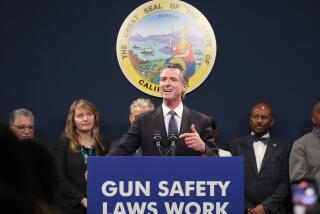Bush Plan May Weaken Gun-Ban Drive
- Share via
WASHINGTON — At its core, President Bush’s long-awaited response to public concern about assault rifles represents an affirmation of the view that criminals--and not weapons--bear responsibility for the mayhem on the nation’s streets.
“The essence of the problem is not guns,” a senior Administration official said Monday in explaining Bush’s decision to reject proposals that assault-style weapons be outlawed altogether. “It’s the uses that people make of those guns.”
Had Bush fully followed through on that conclusion and omitted any action against military-style weapons from his anti-crime initiative, gun-control advocates could have exploited public demand for a crackdown and looked forward to pressing the issue before Congress, where a number of tough measures are pending.
But his willingness to advocate taking some steps toward regulation of such weapons apparently has narrowed that opportunity substantially, congressional observers said.
“This is kind of an illogical half-step,” one Capitol Hill staff member said of the President’s proposal, “but it may take some of the steam away from everything else.”
While refusing to count out the anti-gun measure he has introduced, Sen. Howard M. Metzenbaum (D-Ohio), said in an interview: “It’s a great disappointment. . . . We had hoped that (Bush) would direct himself directly to this very critical issue.”
While ruling out legislation to outlaw any American-made assault weapons, Bush did advocate a maximum capacity of 15 cartridges for the ammunition magazines that help give assault rifles a menacing appearance and allow for extensive firepower.
White House officials said such a provision would apply to “virtually all assault weapons,” but other Administration officials said the effect of such a law would be limited because people could buy weapons with the smaller magazines and replace them with 30-round or even 60-round clips already in circulation.
Bush also emphasized that the Administration plans to enforce a 21-year-old prohibition on the importation of certain foreign-made firearms.
Under the action, a temporary ban on some imported weapons would become permanent if the Treasury Department’s Bureau of Alcohol, Tobacco and Firearms determines that they are not suitable for sporting purposes as the law requires. The agency is scheduled to complete its review of the question late next month.
But the Administration made clear its unwillingness to go further, and suggested that to attempt to ban combat-style firearms outright would be to embark upon a “hopeless and fruitless debate” about gun control and the difficulty of defining an assault weapon.
The President’s small steps nevertheless won him praise from one leading gun-control organization, Handgun Control, whose communications director, Gregg Risch, said: “We’re happy with him today.
“You’re talking about a lifetime member of the National Rifle Assn.,” Risch said of Bush. “His action today acknowledges that the weapons themselves are a problem.”
Other proponents of an assault-rifle crackdown were not as supportive, however. “We still feel the stand on the gun issue is very weak,” said Susie Sawyer of the national Fraternal Order of Police. “. . . Some of us felt he sold out to the NRA.”
The National Rifle Assn. itself objected strongly to the gun-control elements of the Bush proposal. One senior official, James Jay Baker, raised concerns that the Republican Administration had “ventured into the realm of firearms restrictions rather clearly.”
More to Read
Sign up for Essential California
The most important California stories and recommendations in your inbox every morning.
You may occasionally receive promotional content from the Los Angeles Times.













